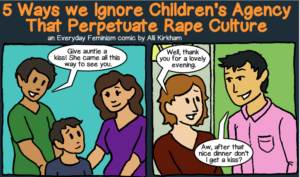
A person bending down with a cheesy smile, with text reading “The Awkward ‘I’ve bent down to a wheelchair user, now what?’ Situation.” SCOPE
When people think of physical disability, they often think of physical limitations, but there are other limitations that come along with how physical disability is perceived.
Disabilities also create many social barriers.
Social interaction frequently becomes awkward and uncomfortable for both people with physical disabilities and nondisabled people because able-bodied people just don’t know how to react to disability.
Admittedly, I had largely written off able-bodied people as a lost cause – that is, until I became active on social media. People suddenly respected my opinion and took me seriously, totally unaware of the fact that I have cerebral palsy and used a wheelchair.
After I “outed” myself as disabled online, I regularly received messages asking me questions about my disability. More significantly, people seemed to be the most interested in how to properly treat and react to disabled people in social situations.
Seeing as I take any opportunity to minimize social awkwardness, I took upon myself to make a handy list.
Here are a few things to avoid doing when meeting or just generally interacting with someone with a physical disability.
1. When introducing yourself, don’t do anything that suggests you’re trying to compensate for their disability.
Yes, I know that you think you’re helping us or making us more comfortable, but there’s a thin line between acknowledgment and patronizing.
For example, if they’re in a wheelchair, don’t bend down to meet their gaze. We know you’re in front of us and we’re well aware of the height difference, so there’s no need to accentuate the obvious.
Although this might be a matter of personal taste, I dread the moment when people try to shake my hand. I have limited mobility in my hands and my fingers aren’t the most functional things in the world, so handshaking isn’t really my forte.
It’s painfully awkward every time to watch them try to pump my hand for a few seconds before letting go of my limp wrist. What started out as a pleasant greeting becomes a moment of discomfort for both parties.
Just be aware of the situation and let the disabled person lead.
Or just use plain old common sense. If they don’t have a right hand, shake the left hand. Problem solved.
2. No baby talk or other child-oriented behavior.
I can’t believe I even have to say this, but you should not be talking to adults the way you would talk to small children.
Unfortunately, people tend to falsely equate physical disability with cognitive delays and translate that assumption into arbitrary assessments of mental age.
This isn’t just obnoxious, it’s insulting.
I can’t tell you how many times I’ve had to sit there with a smile plastered on my face as some middle-aged stranger babbles at me in a singsong voice about how I’m impressive for going to school and wanting to do something with my life.
By deciding how much we’re capable of understanding and then limiting that depth to an elementary school level, you immediately undercut any potential for genuine connection in the conversation.
You don’t determine how much we’re able to process or how intelligent we are. And if you think you can, trust me, we’ll write you off faster than you ever wrote us off.
The same rules apply to gestures often used with children that could be interpreted as patronizing, like hair ruffling, fist bumping, or excessive use of the word “buddy.” It can be difficult to show affection when physical disabilities are involved, but there has to be a less unfortunate way to do it.
As an overall rule, if it’s something you would do with a child under 12, you shouldn’t do it in interactions with an adult.
3. No awkward or invasive personal questions or stories, especially if they’re related to disability.
Let’s try a little role-play: I approach you, introducing myself warmly. As I glance down, I notice that you don’t have a ring on your left hand. Immediately, I ask “Why are you single? Are you divorced?”
You’re probably taken aback, disconcerted, and wondering what relevance your marital status has to the conversation. You’re somewhat offended and confused that I jumped to the conclusion that you are divorced.
The mood shifts and suddenly you’re just going through the motions, wanting the conversation to end as soon as possible.
Now imagine how people with disabilities must feel when you bring up their disability, particularly if you’re a stranger and it’s the first few minutes of interaction.
It’s always the same inevitable barrage of questions: “What happened to you? Why are you in a wheelchair? Did you have an accident? Why can’t you do [insert thing here]?” And then there’s everyone’s favorite: “How does sex work?”
Able-bodied people try and disguise their bluntness with all kinds of politically correct disclaimers, such as, “I’m not trying to be rude,” “You don’t have to answer if you don’t want to,” and “I have [insert obscure disabled relative here], so I know about that.”
Except that by even asking in the first place, you’re implying that it matters and also that you are entitled to answers.
I’m going to let you in on a little secret – we know that you’re dying to know. It’s up to you to recognize when it’s inappropriate to want to know.
Wanting to educate yourself about disability and learn more is great, but there’s a time and a place.
You should have enough sensibility and tact to know that someone who you’ve been acquainted with for all of ten minutes probably isn’t the ideal springboard for all of your burning questions.
Moreover, it’s never our responsibility to educate you. Just because you’re interacting with us doesn’t mean you can milk us for an easy crash course in diversity.
Get to know us before giving us the third degree. Many of the things you’re curious about will come out naturally in conversation. At the same time, you should be prepared that some of us want to keep certain things private and that’s a decision that should be respected.
In addition, steer clear of comparing us to other disabled people you might know or connecting disability to religion. I don’t really want to hear about how much prayer could heal me. Maybe I don’t want to be healed!
4. Don’t make assumptions about our quality of life.
Nothing kills the mood faster in conversation than constantly being reminded of your disability.
One of the things able-bodied people seem especially hell-bent on doing is talking about what a good sport you are for existing while disabled.
This often devolves into increasingly patronizing generalizations that, no matter how well-intentioned, become backhanded insults that frankly just make disabled people feel bad about themselves.
A few that I routinely hear are “I couldn’t do what you do,” “I’m glad I don’t have to deal with that,” and my personal favorite, “I don’t know how you get out of bed in the morning.”
Excuse me, who gave you the right to determine that my life is worth living or that how I live it is undesirable?
Sure, I may have physical barriers that are irritating, but that doesn’t mean other aspects of my life aren’t incredibly rewarding. Does that mean everyone who breaks a limb should lay silently in the dark until they recover?
In making these statements, you are implying that disabled life is a waste and you would rather be dead than disabled. That doesn’t exactly compel us to want to continue the interaction — or really ever associate with you again.
And then there’s the I word: inspiration. We’re all inspirations for being “brave enough” to want to, you know, accomplish something while not 100% able-bodied.
I hate to break it to you, but I don’t really give a fuck about inspiring you, especially if your definition of inspiration is “thanks for giving me perspective on my life and my privilege with what I assume is your comparatively crappy life.”
No, thank you.
We’re just trying to live our lives like everyone else. Stop comparing yourselves to us. We’re well aware of the fact that we’re not able-bodied and most of us still have lots of ambitions, so we don’t have time or patience for your commentary.
5. Treat people with disabilities the same as you would treat anyone else.
Ultimately, there’s really no cheat sheet on interacting with disabled people.
But don’t despair; this article still has a purpose.
Consider this: Disabled people are always people first. Our disability should never be an excuse to patronize us or dehumanize us.
You can’t have a manual on how to deal with a certain group of people because that totally distracts from the point that you’re just two people trying to make a connection.
If you perpetually have to remind yourself of the PC way to handle people with disabilities, you’re probably overthinking it or doing it wrong.
Yes, it’s important to have an extra sense of awareness around people who have physical disabilities and you should always strive to make the other person feel as comfortable as possible. But that doesn’t mean that your conversation should be limited to those parameters.
I would hope you would get more out of interaction with us beyond breathing a sigh of relief that you didn’t do anything inappropriate.
Despite our wheelchairs or crutches or other handicaps, we are just like you. Engage us like any other person you would encounter.
Talking to physically disabled people shouldn’t be awkward or uncomfortable for anyone. Just start with a simple hello!
[do_widget id=”text-101″]
Erin Tatum is a Contributing Writer at Everyday Feminism. She’s a feminist, queer theory lover, and television enthusiast living in Pennsylvania. She is particularly interested in examining the representation of marginalized identities in media. In addition to Everyday Feminism, she’s also a weekly contributor to Bitch Flicks. Follow her on Twitter @ErinTatum91 and read her articles here.
Search our 3000+ articles!
Read our articles about:
Our online racial justice training
Used by hundreds of universities, non-profits, and businesses.
Click to learn more




















